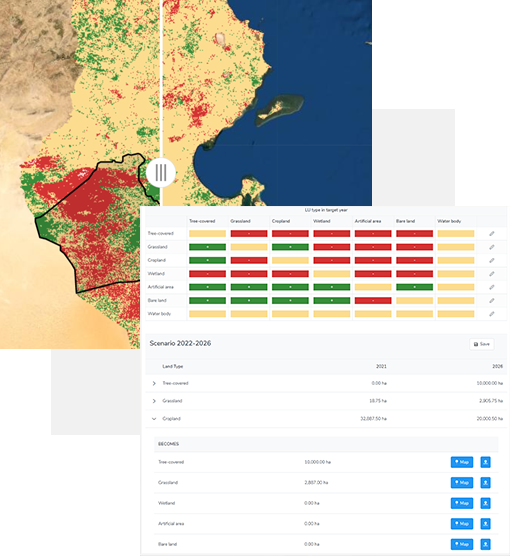
WHAT IS LUP4LDN?
A monitoring tool for Land Degradation (SDG 15.3.1), integrating LDN into a participatory land use planning approach via an interface that allows users to evaluate land use management transition scenarios.
is most crucial to focus land restoration efforts?
SLM interventions are optimal and feasible in order to achieve LDN?
Global gridded maps for land use, soil organic carbon and socio-ecological indices
Visual and quantitative representations of LD gains and losses

About Us
The LUP4LDN mission
Designed as a ‘federated system’ – an open, collaborative and global network of independent data hubs equitably sharing information and knowledge relating to LDN, and as a monitoring tool aims to support users in achieving the relevant SDG 15.3.1 sub-indicators through analysing national and local data.
LUP4LDN was funded by a competitive grant from GEO-LDN.

Supported
Countries

Completed
Projects

Processed
Geospatial Data

CPU
Hours
who we target
Our Users
As a software analytics tool, it supports policy-makers, land use planners, land users, national and sub-national organisations and research agencies in understanding optimal and feasible SLM interventions for LDN, alongside crucial areas to focus land restoration efforts.

policy-makers

land use planners

land users

organisations / agencies
Testimonials
What our users say
about us

How to plan for
Optimal Land Use
DEFINE
projects
Set the spatiotemporal context for your intervention at country, regional or local level and seamlessly collaborate with your team.

ANALYSE
transition scenarios
Use trusted data sources and applicable SLM practices to evaluate different options for using and managing land under your LDN goals.

GET
actionable reports
Generate assessment reports for your LDN-informed Land Use and Management scenarios, backed by data presented in tabular and/or map formats.

How to
FAQS
You have to know before
start everything
- Trends.Earth is an online platform that monitors land change and land degradation using satellite imagery and global data. The tool also supports countries in analyzing data to prepare for their reporting committments to the United Nations Convention to Combat Desertification (UNCCD).
- QGIS is an open-source cross-platform desktop geographic information system application that supports viewing, editing, and analysis of geospatial data.

Our Team
Meet Our Experts






